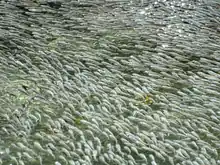Sulphur molly
The sulphur molly (Poecilia sulphuraria), locally known as molly del Teapa, is an endangered species of fish in the family Poeciliidae.[1] It is endemic to Mexico, specifically to the Baños del Azufre (Grijalva River basin) near Teapa, Tabasco. The Baños del Azufre are sulfidic springs that contain high concentrations of toxic hydrogen sulfide (H
2S). Poecilia sulphuraria has apparently evolved the ability to tolerate the toxic conditions.[3] A few other Poecilia species are known from similar habitats in Mexico.[4]
| Sulphur molly | |
|---|---|
 | |
| Scientific classification | |
| Domain: | Eukaryota |
| Kingdom: | Animalia |
| Phylum: | Chordata |
| Class: | Actinopterygii |
| Order: | Cyprinodontiformes |
| Family: | Poeciliidae |
| Genus: | Poecilia |
| Species: | P. sulphuraria |
| Binomial name | |
| Poecilia sulphuraria (Álvarez, 1948) | |
| Synonyms[2] | |
| |
See also
- Widemouth gambusia (Gambusia eurystoma), another fish endemic to Baños del Azufre in Tabasco, Mexico
References
- Lyons, T.J.; Vega-Cendejas, M.; Valdes Gonzales, A. (2019). "Poecilia sulphuraria". IUCN Red List of Threatened Species. 2019: e.T17833A1531411. doi:10.2305/IUCN.UK.2019-2.RLTS.T17833A1531411.en. Retrieved 17 November 2021.
- Froese, Rainer; Pauly, Daniel (eds.) (2019). "Poecilia sulphuaria" in FishBase. August 2019 version.
- Tobler, M.; Riesch, R.; Garcia de Léon, F. J.; Schlupp, I. & Plath, M. (2008). "Two endemic and endangered fishes, Poecilia sulphuraria (Alvarez, 1948) and Gambusia eurystoma Miller, 1975 (Poeciliidae, Teleostei), as only survivors in a small sulphidic habitat". Journal of Fish Biology. 72 (3): 523–533. doi:10.1111/j.1095-8649.2007.01716.x.
- Palacios, Arias-Rodriguez, Plath, Eifert, Lerp, Lamboj, Voelker, & Tobler (2013). The Rediscovery of a Long Described Species Reveals Additional Complexity in Speciation Patterns of Poeciliid Fishes in Sulfide Springs. PLoS ONE 8(8): e71069.
Further reading
- Doran, Carolina; Bierbach, David; Lukas, Juliane; Klamser, Pascal; Landgraf, Tim; Klenz, Haider; Habedank, Marie; Arias-Rodriguez, Lenin; Krause, Stefan; Romanczuk, Pawel; Krause, Jens (2022). "Fish waves as emergent collective antipredator behavior". Current Biology. 32 (3): 708–714.e4. doi:10.1016/j.cub.2021.11.068. PMID 34942081. S2CID 245423673.
- "These fish work together by the hundreds of thousands to make waves".
External links
This article is issued from Wikipedia. The text is licensed under Creative Commons - Attribution - Sharealike. Additional terms may apply for the media files.
